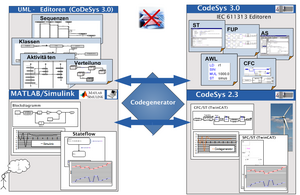Model-based Engineering
Model-based Engineering of Variant-rich, Interdisciplinary Manufacturing Systems
Description

In this field of research, the institute AIS investigates concepts and methods that address the model-based development of industrial production automation systems of different domains such as discrete manufacturing processes as well as continuous (chemical) production processes. A special focus is put on the interdisciplinary character of the design of industrial automation systems as well as on increasing the transparency and handling the complexity throughout the workflow of automation systems’ design and operation. In addition, concepts for the integration of energy aspects with the modeling of the operating performance (behavior) of production systems and automotive systems are explored. Therefore, different modeling languages are investigated and adapted for these different classes of mechatronic systems and corresponding editors and tool environments have been developed. For the coupling and synchronization of heterogeneous models model transformations as well as formal methods for consistency checking have been successfully investigated. Concerning the transfer of research results into industrial applications, a major outcome of this field of research is the successful realization of approaches for model-based automation software development, code generation, and model-based debugging as well as software testing inside a development environment for automation software that is widely used in industry.
SPP1593 - Design For Future
AutoMES - Automated Generation of Manufacturing Execution Systems
EfiMA - Efficient troubleshooting for safe, variant-rich machine and plant automation
MASSIVE - Model synthesis from sequence-based behavioral requirements for model-based test case generation
V&V Artemis - Variability and Versioning during requirements based test case generation and selection for mechatronic systems
KonMaFS (DFG 2021-2023) - Consistent Development of Automated Material Flow Systems using a model-based Approach